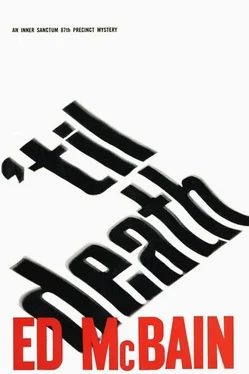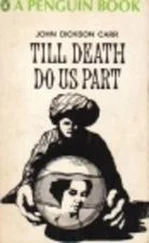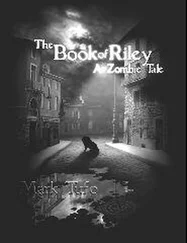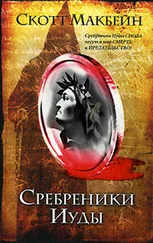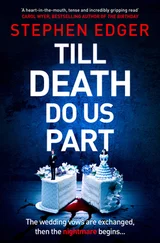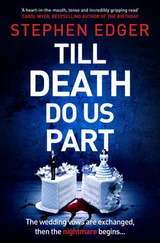Charlie thought for a moment. “Neither,” he said at last. “He walked straight up the avenue.”
“And then what?”
“I don’t know.”
“Did he turn at the corner?”
“I don’t know.”
“You lost him after he walked past that corner?”
“I don’t know whether he walked past that corner or not. Who lost him? I wasn’t even trying to find him. Who was interested in him?”
“Do you think he passed that corner?”
“I don’t know.”
“Do you think he turned at the corner?”
“I don’t know.”
“Could he have crossed the street?”
“I’m telling you, I don’t know.” He paused. “Listen, why don’t you ask the guy in the deli on the next corner. Maybe he seen him.”
“Thanks, son,” Meyer said, “we’ll do that.”
“I’m sorry,” Charlie said. “Does it have to be a trombone player?”
“I’m afraid so.”
“‘Cause my kid sister plays some gone piano, I mean it.” Meyer looked at Charlie sadly. Charlie shrugged. “So some guys go for horns,” he said resignedly, and he went back into the candy store.
Meyer and O’Brien started up the avenue.
“What do you think?” O’Brien said.
“Sounds as if it might be him. Who knows? Maybe we’ll have some luck in the delicatessen.”
They did not have any luck in the delicatessen.
The man behind the counter wore bifocals, had been busy all day waiting on Sunday customers, and wouldn’t have known a trombone case from a case of crabs, good day.
Meyer and O’Brien went out onto the sidewalk.
“Where to?”
Meyer shook his head. “Boy,” he said, “this suddenly seems like a very big neighborhood.”
Ben Darcy lay on his back in the bushes.
Dusk was coming on, staining the sky with purple. In the woods, the insects were beginning their night song. The city looked skyward and greeted the impending night with a sigh; this was Sunday and tomorrow was another workday. And in the city, in the imposing steel and concrete structures of Isola, in the teeming streets of Calm’s Point, in the suburban outlands of Riverhead, the beginning of night seemed to bring with it a touch of peace, a restfulness that bordered on weary resignation. Another day was moving into the coolness of the past. The moon would rise, and stars would pepper the skies, and the city would suddenly be ablaze with light.
Ben Darcy seemed to be a part of the peacefulness of dusk. Lying on his back on the ground beneath the big maple that dominated the surrounding area of bushes, he looked like nothing more than a summer sleeper, a dreamer, a sky-watcher, the classic boy with the strand of straw between his teeth. His arms were outstretched. His eyes were closed. He seemed to be asleep, at peace with himself and with the world.
The top of his skull was bleeding.
Stooping down beside him quickly, Carella saw the cut at once, and his fingers moved to it rapidly, parting the hair, feeling the swelling around the gash. The cut was not a deep one or a long one, nor did it bleed profusely. It sat in the exact center of Darcy’s skull, and the area surrounding it had swelled to the size of a walnut. In the growing darkness, Steve Carella sighed audibly. He was tired, very tired. He did not enjoy chasing specters. I should have been a prizefighter, he thought. A good dirty sport where the combat is clearly stated from go, where the rules are set down by an impartial observer, where the arena is circumscribed from the very beginning, where the opponent is plainly visible and plainly identified as the opponent, the only man to beat, the only enemy.
Why the hell would anyone ever choose police work as his profession, he wondered.
We’re dealing with destruction, he thought, and the destruction is always secret and our job is not so much preventing it as it is discovering it after it has happened. We seek out the destroyers, but this doesn’t make us creators because we are involved in a negative task, and creation is never a negative act. Teddy, sitting out there, with a baby inside her, creating with no effort, creating by nature, is accomplishing more than I’ll accomplish in fifty years of police work. Why would anyone ever want to get involved with a son of a bitch who saws through the tie rods of an automobile or kills the neighbor, Birnbaum, or takes a whack at the skull of Darcy? Why would anyone choose as his profession, as the job to which he devotes most of his waking hours, a task that must necessarily bring him into contact with the destroyers?
Why would anyone deliberately involve himself in the murky, involuted motivational processes of the criminal mind, dirty his hands with the crawling specimens of humanity who parade into that squadroom every day of the week, every week of the year?
Why would anyone want to become a street cleaner?
I will tell you some things, Steve, he thought.
I will tell you first that philosophy is unbecoming to a cop who almost flunked Philosophy I in school.
I will tell you secondly that free choice is something that is very rarely offered to human beings. You became a cop because you became a cop, and you couldn’t tell yourself why without spending hours on a head shrinker’s couch, and even then you might not know. And you remain a cop — why?
Because — discounting the obvious knowledge that a man must feed and clothe his wife and his family, discounting any insecurities about facing the world outside the police department, scrounging for a job when I’m no longer a boy, discounting any of this — I want to be a cop.
Not because someone has to clean the streets. Maybe no one has to clean the streets at all. Maybe civilization would move along just as briskly if the streets were filthy as hell.
But the destroyers make me angry. When the destroyers take life from a man like Birnbaum, they make me mad as hell! And so long as destruction makes me angry, I’ll continue to be a cop, I’ll continue commuting to a scroungy squadroom in perhaps the world’s worst neighborhood, listening to bum jokes delivered by other cops, listening to corny humor, and telephones ringing, and complaints from the gentle people who — though they may not all be creators — are not destroyers.
In the deepening darkness, he grinned wanly.
You may not have realized it, Father Paul, he thought, but you had a very religious man in your rectory today.
He left Ben Darcy lying on his back, and he went to the house for some water and some damp rags.
The wedding jokes were beginning.
Standing before the long bridal table upon which rested the trays of dolci and the huge wedding cake and — at the far end — two bottles of wine marked separately and respectively for the bride and the groom, Tommy listened to the wedding jokes with mixed feelings. He was embarrassed by them, but he was also secretly pleased by them. He knew he was supposed to be embarrassed by them, but he was also secretly pleased by them. He knew he was supposed to be embarrassed and so each new joke brought a flush to his boyish features. But at the same time, he secretly felt as if he had achieved manhood at last. Finally, he was being granted admission to a worldwide fraternity as a junior member. Years from now, perhaps, he would attend someone else’s wedding and tell the same ritual jokes. The knowledge pleased him, even though he’d heard most of the jokes before. The jokes had started with that hoary old standby of the man who leaves his umbrella in a hotel room that is later occupied by a honeymoon couple. About to retrieve the umbrella as they enter the room, he ducks into a closet and is forced to listen to their cooing lovemaking. Finally in desperation, after listening to the groom asking the bride questions like “And whose eyes are these?” — “ Yours, darling” — “And whose lovely lips are these?” — “ Yours, sweetheart” — on and on, sparing no part of the anatomy, the joke tinged with the delicious unsavoriness of total possession and the anticipation of an outer-directed striptease, the man in the closet shouts, “When you get to the umbrella, it’s mine!”
Читать дальше
